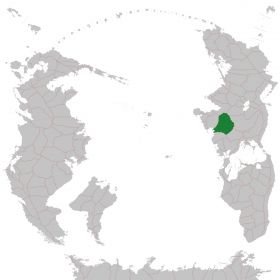Sallodesia (Pacifica)
Republic of Sallodesia | |
|---|---|
|
Flag | |
Motto: "Hic manebimus optime." "Here we'll remain most excellently." | |
Anthem: Sallodesian forever! | |
 Location of Sallodesia (dark green) | |
| Capital | Salisbury |
| Largest largest city | Bulowayo |
| Official languages | Austral |
| Recognised national languages | Austral, Shonambe, Nendombe, Kitasha & Hazlish |
| Ethnic groups | 53,3% White —52,2% Izaakian —25,5% Kosbaraans —8,3% Snovian —5,3% Gianatlan —6,1% Terminan —2,2% Doge Landian —0,8% Myrian —4,9% Others 28,7% Black —64,2% Matakambe —17,1% Ndembe —9,4% Kitonge —7,2% Hazles —2,1% Terminan 11,2% Multiracial 2,8% Asian —75,7% Terminan —24,3% Others 0,7% Others |
| Religion | 58,4% Christianity —68,5% Protestantism —14,6% Kaalism —10,4% Catholicism —6,5% Others 23,6% No religion 12,4% Traditional faiths 6.6% Others |
| Demonym(s) | Sallodesian |
| Government | Federal Presidential Republic |
• President | George D. Smith |
• Vice-President | Riley M. Ryan |
| Legislature | Congress |
| Senate | |
| House of Representatives | |
| Independence from | |
| Area | |
• Total | 382.538 km2 (147.699 sq mi) |
• Water (%) | 1.36 |
| Population | |
• 2021 census | 64.243.874 |
• Density | 167/km2 (432.5/sq mi) |
| GDP (nominal) | estimate |
• Total | $ 3,59 trillion (SAD $ 3,14 trillion) |
• Per capita | $ 55.900,64 (SAD $ 48.872,74) |
| Gini | 40.8 medium |
| HDI | 0.91 very high |
| Currency | Sallodesian Dollar ($) (SAD) |
| Time zone | UTC+2 (CBT) |
| Date format | 11/11/1921 CE |
| Driving side | left |
| Calling code | +257 |
| World Forum Code | SAL |
| Internet TLD | .sal |
"Once you're a Sallodesian, no other land will do."—Sallodesian proverb
Etymology
The word Sallodesia is derived from the name Sallow. John Edmond Sallow was an Izaakian business magnate that propelled the colonization of the lands that now make up Sallodesia. The country was named in his honour for his tremendous colonization efforts.
History
Prehistory
Matakambe Empire
Hudson Pirate Republic
After the exile of the imperial Iceborn family from [[Montacia (Pacifica)|Montacia early in the 16th century, the Iceborn family turned to piracy. One of the first ports they founded was Port Hudson which quickly became a pirate haven. This port would later become the foundation of a Pirate Republic and later Sallodesian colonization efforts. However, as the Iceborn family roamed the seas, a notorious pirate captain named Maxwell "Red Beard" Darby amassed support amongst the pirate fleets and proclaimed the Hudson Pirate Republic in 1572. Diminishing the legitimacy of the Iceborn family among the pirates and forming their own league. Similar to the Iceborn family, the Hudson Pirate Republic wrecked havoc on cross-Pacific trade and commerce. In some instances, Hudson pirate even waited on Iceborn pirates to capture loot from commerce ships, only for them to attack the weakened Iceborn pirates. This lead to increasing hostilities between the two pirate factions which resulted in the [Battle of Port Hudson 1664 (Pacifica)|Battle of Port Hudson]] in 1664. Port Hudson was devastated by Iceborn pirate forces and pillaged to the ground. After this battle, the Hudson Pirate Republic ceased to exist and Port Hudson was reduced to a free city
Gianlucian colonization
Shortly after the piracy age had ended in 1784, Gianlucian colonizers founded the port city of Kielburg at the mouth of the Zambezi river. Slowly over the centuries and the colonial age, the Gianlucians expanded their territory on the Bailtem continent and formed a large region known as Hazelbrüst.
Corporate Mandate
Once the Iceborn family and their new nation Izaakia regained their strength, they set out to retake their lost territories in Montacia and Brodlancia. Instead of direct imperial rule, a business magnate named John Edmond Sallow convinced the Iceborn family to fund his expedition to reclaim the territory lost during the piracy age. Together with his corporation, Sallow Expeditionary Company, Sallow set out to rebuild Port Hudson in 1698. To do so the S.E.C. lead many expeditions to scout out new resources inlands. This put them at odds with the native Matakambe population. For the next hundred years the S.E.C. expanded inwards and offered amical agreements with the native population who slowly moved eastwards.
Colonial Reformation
First Matakambe Wars
In 1831, the S.E.C. wished to claim new lands from the Matakambe. However, the Matakambe clans had fought against each other and too much blood had been spilled according to Matakambe laws. With the native population resolute as ever to stand their ground, the S.E.C. brought in mercenaries to clear out the Matakambe lands. For the following two years, the newly founded Sallow Expeditionary Security Forces, killed off Matakambe clans and forced them to relocate further east. The size of the territory controlled by the S.E.C. increased ten fold as a result of this war and the Company was forced to seek out new alternatives to maintain this newly claimed territory.
First Kosbaran Trek
1835
Second Matakambe Wars
Second Kosbaran Wave
1890
Operation Orangutan
Attack on Montacia 1921
UDI
1921 - Ryan Smith
